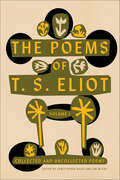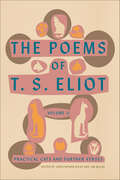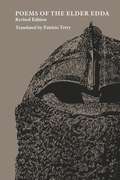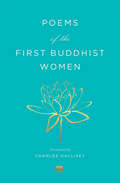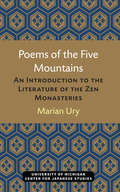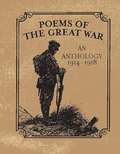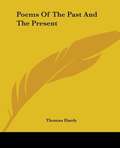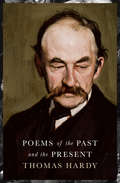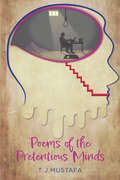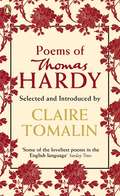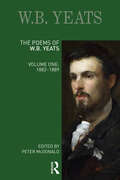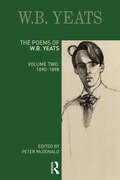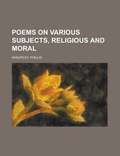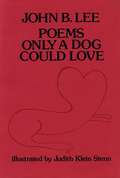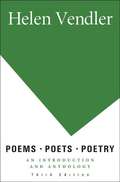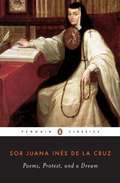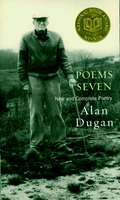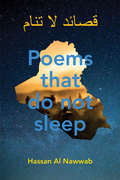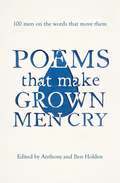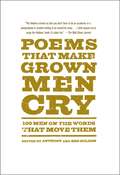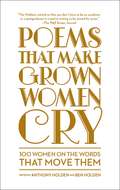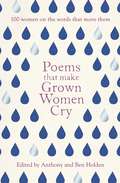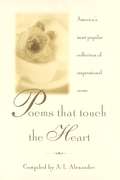- Table View
- List View
The Poems of T. S. Eliot, Volume I: Collected and Uncollected Poems (Poems of T. S. Eliot)
by T. S. EliotThe first volume of the first paperback edition of The Poems of T. S. EliotThis two-volume critical edition of T. S. Eliot’s poems establishes a new text of the Collected Poems 1909–1962, rectifying accidental omissions and errors that have crept in during the century since Eliot’s astonishing debut, “The Love Song of J. Alfred Prufrock.” In addition to the masterpieces, The Poems of T. S. Eliot contains the poems of Eliot’s youth, which were rediscovered only decades later; poems that circulated privately during his lifetime; and love poems from his final years, written for his wife, Valerie. Calling upon Eliot’s critical writings as well as his drafts, letters, and other original materials, Christopher Ricks and Jim McCue have provided a commentary that illuminates the imaginative life of each poem.This first volume respects Eliot’s decisions by opening with his Collected Poems 1909–1962 as he arranged and issued it shortly before his death. This is followed by poems uncollected but either written for or suitable for publication, and by a new reading text of the drafts of The Waste Land. The second volume opens with the two books of verse of other kinds that Eliot issued: Old Possum’s Book of Practical Cats and Anabasis, his translation of St.-John Perse’s Anabase. Each of these sections is accompanied by its own commentary. Finally, pertaining to the entire edition, there is a comprehensive textual history that contains not only variants from all known drafts and the many printings but also extended passages amounting to hundreds of lines of compelling verse.
The Poems of T. S. Eliot, Volume II: Practical Cats and Further Verses (Poems of T. S. Eliot)
by T. S. EliotThe second volume of the first paperback edition of The Poems of T. S. EliotThis two-volume critical edition of T. S. Eliot’s poems establishes a new text of the Collected Poems 1909–1962, rectifying accidental omissions and errors that have crept in during the century since Eliot’s astonishing debut, “The Love Song of J. Alfred Prufrock.” In addition to the masterpieces, The Poems of T. S. Eliot contains the poems of Eliot’s youth, which were rediscovered only decades later; poems that circulated privately during his lifetime; and love poems from his final years, written for his wife, Valerie. Calling upon Eliot’s critical writings as well as his drafts, letters, and other original materials, Christopher Ricks and Jim McCue have provided a commentary that illuminates the imaginative life of each poem.Following the collected and uncollected poems of the first volume, this second volume opens with the two books of verse of other kinds that Eliot issued: the children’s verse of Old Possum’s Book of Practical Cats, and Anabasis, his translation of St.-John Perse’s Anabase. This volume then gathers the verses that Eliot contributed to the learnedly lighthearted exchanges of Noctes Binanianæ, and others that he wrote off-the-cuff or for intimate friends. Each of these sections is accompanied by its own commentary. Finally, pertaining to the entire edition, there is a comprehensive textual history that contains not only variants from all known drafts and the many printings but also extended passages amounting to hundreds of lines of compelling verse.
Poems of the Elder Edda
by Charles W. Dunn Patricia TerryThe great poetic tradition of pre-Christian Scandinavia is known to us almost exclusively though the Poetic Edda. The poems originated in Iceland, Norway, and Greenland between the ninth and thirteenth centuries, when they were compiled in a unique manuscript known as the Codex Regius.The poems are primarily lyrical rather than narrative. Terry's readable translation includes the magnificent cosmological poem Völuspá ("The Sibyl's Prophecy"), didactic poems concerned with mythology and the everyday conduct of life, and heroic poems, of which an important group is concerned with the story of Sigurd and Brynhild.Poems of the Elder Edda will appeal to students of Old Norse, Icelandic, and Medieval literature, as well as to general readers of poetry.
Poems of the First Buddhist Women: A Translation of the Therigatha (Murty Classical Library Of India - Hup Ser. #3)
by Charles HalliseyThe Therīgāthā is one of the oldest surviving literatures by women, composed more than two millennia ago and originally collected as part of the Pali canon of Buddhist scripture. These poems were written by some of the first Buddhist women—therīs—honored for their religious achievements. Through imaginative verses about truth and freedom, the women recount their lives before ordination and their joy at attaining liberation from samsara. Poems of the First Buddhist Women offers startling insights into the experiences of women in ancient times that continue to resonate with modern readers. With a spare and elegant style, this powerful translation introduces us to a classic of world literature.
Poems of the Five Mountains: An Introduction to the Literature of the Zen Monasteries (Michigan Monograph Series in Japanese Studies #10)
by Marian UryThis second, revised edition of a pioneering volume, long out of print, presents translations of Japanese Zen poems on sorrow, old age, homesickness, the seasons, the ravages of time, solitude, the scenic beauty of the landscape of Japan, and monastic life. Composed by Japanese Zen monks who lived from the last quarter of the thirteenth century to the middle of the fifteenth century, these poems represent a portion of the best of the writing called in Japanese gozan bungaku, “literature of the five mountains.” “Five mountains” or “five monasteries” refers to the system by which the Zen monasteries were hierarchically ordered and governed. For the monks in the monasteries, poetry functioned as a means not only of expressing religious convictions and personal feelings but also of communicating with others in a civilized and courteous fashion. Effacing barriers of time and space, the practice of Chinese poetry also made it possible for Japanese authors to feel at one with their Chinese counterparts and the great poets of antiquity. This was a time when Zen as an institution was being established and contact with the Chinese mainland becoming increasingly frequent—ten of the sixteen poets represented here visited China. Marian Ury has provided a short but substantial introduction to the Chinese poetry of Japanese gozan monasteries, and her translations of the poetry are masterful. Poems of the Five Mountains is an important work for anyone interested in Japanese literature, Chinese literature, East Asian Religion, and Zen Buddhism.
Poems of the Great War: An Anthology 1914-1918 (RP Minis)
by Edited by Christopher NavratilWorld War I poetry collection arranged chronologically from 1914-1918 from a range of prominent poets, many killed in battle.
Poems of the Past and the Present
by Thomas HardyThis scarce antiquarian book is a facsimile reprint of the original. Due to its age, it may contain imperfections such as marks, notations, marginalia and flawed pages. Because we believe this work is culturally important, we have made it available as part of our commitment for protecting, preserving, and promoting the world's literature in affordable, high quality, modern editions that are true to the original work.
Poems of the Past and the Present (Collected Works Of Thomas Hardy)
by Thomas HardyThe second collection of poetry from the author of such classics as Tess of the D&’Urbervilles and Far from the Madding Crowd.Although well known for his novels, like Jude the Obscure, Thomas Hardy also wrote poetry throughout his life. Poems of the Past and the Present is Hardy&’s second volume of poetry, originally published in 1901. This wide-ranging collection is divided into five sections: War Poems, Poems of Pilgrimage, Miscellaneous Poems, Imitations, Etc., and Retrospect. It features some of Hardy&’s finest work, including &“At a Lunar Eclipse,&” &“The Darkling Thrush,&” &“The Ruined Maid,&” &“The Self Unseeing,&” &“The Well-Beloved,&” and &“Drummer Hodge&” (originally titled &“The Dead Drummer&”).
Poems of the Pretentious Minds
by Tj MustafaPoems of the Pretentious Minds features a wide array of self-indulgent, darkly comical but heart-wrenching poetry that covers many topics such as love, family, friendship, death, sex addiction, abuse, anxiety, depression, suicide, mental turmoil, the city of London, various other locations around the UK and the intricacies of the world itself. Some of the poems also explore the contradiction of humanity and how one can appreciate the minute things in life, whilst others delve deeper into the human condition and how our emotions can ultimately cloud our judgement. Later poems take a more autobiographical approach and instead focus on the poet himself, detailing his personality, conflicting emotions, life experiences, deep-rooted thoughts and his overall outlook of the world. Most of the poems have a sharply satirical edge to them, particularly the ones that focus on modern-day society as a whole, and real life events that have sparked mass debate and controversy.
Poems of Thomas Hardy
by Thomas HardyThomas Hardy wrote some of the most moving and personal poems in his era and this collection brings together the best of his verse on life and love.Hardy's poems are by turn haunting, intense, songlike humerous and tender. From snatched lovers' meetings to the wreck of the Titanic from the death of a Dorest drummer boy in the Boer War to memories of his dead wife Emma, from ghosts, loss and longing to pleasure in landscape and weather, they tell the story of one of our best-loved writers, and the people and places that inspired him.
The Poems of W.B. Yeats: Volume One: 1882-1889 (Longman Annotated English Poets)
by Peter McDonaldIn this multi-volume edition, the poetry of W.B. Yeats (1865–1939) is presented in full, with newly-established texts and detailed, wide-ranging commentary. Yeats began to write verse in the nineteenth century, and over time his own arrangements of poems repeatedly revised and rearranged both texts and canon. This edition of Yeats’s poetry presents all his verse, both published and unpublished, including a generous selection of textual variants from the many manuscript and printed sources. The edition also supplies the most extensive commentary on Yeats’s poetry to date, explaining specific references, and setting poems in their contexts; it also gives an account of the vast range of both literary and historical influences at work on the verse. The poems are presented in order of composition, and major revisions or rewritings of poems result in separate inclusions (in chronological sequence) for these writings as they were subsequently reconceived by the poet. This first volume collects Yeats’s poetry of the 1880s, from his ambitious and extensive juvenilia (including hitherto little-noticed dramatic poems) to his earliest published pieces, leading to his first substantial book of verse. The pastoral romance of classically-inflected early work like ‘The Island of Statues’ is succeeded in these years by the Irish mythic material that finds its largest canvas in the mini-epic ‘The Wanderings of Oisin’. In Yeats’s work through the 1880s, an adolescent poet’s youthful absorption in Romantic poetry is replaced by a commitment to esoteric religious speculation and Irish political nationalism. This edition allows readers to see Yeats’s emergence as a poet step by step in compelling detail in relation to his literary influences – including, significantly, the Anglo-Irish poetry of the nineteenth century. The commentary provides an extensive view of Yeats’s developing personal, cultural, and historical worlds as the poems gain in maturity and depth. From the first attempts at verse of a teenage boy to the fully accomplished writings of an original poet standing on the verge of popular success with poems such as ‘The Lake Isle of Innisfree’, Yeats’s poetry is displayed here in unprecedented fullness and detail.
The Poems of W. B. Yeats: Volume Two: 1890-1898 (Longman Annotated English Poets)
by Peter McDonaldIn this multi-volume edition, the poetry of W.B. Yeats (1865–1939) is presented in full, with newly-established texts and detailed, wide-ranging commentary. Yeats began to write verse in the nineteenth century, and over time his own arrangements of poems repeatedly revised and rearranged both texts and canon. This edition of Yeats’s poetry presents all his verse, both published and unpublished, including a generous selection of textual variants from the many manuscript and printed sources. The edition also supplies the most extensive commentary on Yeats’s poetry to date, explaining specific references, and setting poems in their contexts; it also gives an account of the vast range of both literary and historical influences at work on the verse. The poems are presented in order of composition, and major revisions or rewritings of poems result in separate inclusions (in chronological sequence) for these writings as they were subsequently reconceived by the poet. In this second volume, the poems of Yeats’s early maturity emerge in the contexts of his engagement with Irish history and myth, along with nationalist politics; his increasing involvement with ritual magic and esoteric lore; and his turbulent, often unhappy, personal life. The poems of The Countess Kathleen and Various Legends and Lyrics (1892) reveal a poet of intense narrative power and metaphorical resource, adept at transforming miscellaneous sources into haunting and original poems. A major revision of his earlier narrative, ‘The Wanderings of Oisin’, takes place in this decade when Yeats is also taken up with the composition of elaborate and uncanny symbolic lyrics, many of them resulting from his love for Maud Gonne, that are finally collected in The Wind Among the Reeds (1899). This edition makes it possible to trace in detail Yeats’s debts to folklore and magic, alongside his involved and often difficult private and public life, in poetry of exceptional complexity and power.
Poems on the Underground
by Gerard Benson, Judith Chernaik and Cicely Herbert Gerard Benson Judith Chernaik Cicely HerbertThis wonderful new edition of Poems on the Underground is published to celebrate the 150th anniversary of the Underground in 2013. Here 230 poems old and new, romantic, comic and sublime explore such diverse topics as love, London, exile, families, dreams, war, music and the seasons, and feature poets from Sappho to Carol Ann Duffy and Wendy Cope, including Chaucer and Shakespeare, Milton, Blake and Shelley, Whitman and Dickinson, Yeats and Auden, Seamus Heaney and Derek Walcott and a host of younger poets. It includes a new foreword and over two dozen poems not included in previous anthologies.
Poems on various subjects, religious and moral
by Phillis WheatleyExcerpt: . . . years, by thee Recover'd, in due order rang'd we see: Thy pow'r the long-forgotten calls from night, That sweetly plays before the fancy's sight. Mneme in our nocturnal visions pours The ample treasure of her secret stores; Swift from above the wings her silent flight Through Phoebe's realms, fair regent of the night; And, in her pomp of images display'd, To the high-raptur'd poet gives her aid, Through the unbounded regions of the mind, Diffusing light celestial and refin'd. The heav'nly phantom paints the actions done By ev'ry tribe beneath the rolling sun. Mneme, enthron'd within the human breast, Has vice condemn'd, and ev'ry virtue blest. How sweet the sound when we her plaudit hear? Sweeter than music to the ravish'd ear, Sweeter than Maro's entertaining strains Resounding through the groves, and hills, and plains. But how is Mneme dreaded by the race, Who scorn her warnings and despise her grace? By her unveil'd each horrid crime appears, Her awful hand a cup of wormwood bears. Days, years mispent, O what a hell of woe Hers the worst tortures that our souls can know. Now eighteen years their destin'd course have run, In fast succession round the central sun. How did the follies of that period pass Unnotic'd, but behold them writ in brass In Recollection see them fresh return, And sure 'tis mine to be asham'd, and mourn. O Virtue, smiling in immortal green, Do thou exert thy pow'r, and change the scene; Be thine employ to guide my future days, And mine to pay the tribute of my praise. Of Recollection such the pow'r enthron'd In ev'ry breast, and thus her pow'r is own'd. The wretch, who dar'd the vengeance of the skies, At last awakes in horror and surprise, By her alarm'd, he sees impending fate, He howls in anguish, and repents too late. But O what peace, what. . . "
Poems, Poets, Poetry: An Introduction and Anthology,Third Edition
by Helen VendlerMany students today are puzzled by the meaning and purpose of poetry. Poems, Poets, Poetry demystifies the form and introduces students to its artistry and pleasures, using methods that Helen Vendler has successfully used herself over her long, celebrated career. Guided by Vendler’s erudite yet down-to-earth approach, students at all levels can benefit from her authoritative instruction. Her blend of new and canonical poets includes the broadest selection of new and multi-racial poets offered by any introductory text. Comprehensive and astute, this text engages students in effective ways of reading — and taking delight in — poetry.
Poems, Protest, and a Dream
by Sor Juana Ines de la Cruz Margaret Sayers PedenSor Juana Ines de la Cruz (1648-1695) wrote her most famous prose work, La Respuesta a Sor Filotea, in 1691 in response to her bishop's injunction against her intellectual pursuits. A passionate and subversive defense of the rights of women to study, to teach, and to write, it predates by almost a century and a half serious writings on any continent about the position and education of women. Moreover, notes Ilan Stavans in his introduction, it has become "a cornerstone of Hispanic-American identity ... at once a chronicle of the tense gender relations in the Western Hemisphere, a rich portrait of the social behavior that prevailed more than a century before independence from Spain was gained in 1810, and the very first intellectual autobiography written by a criolla in a hemisphere known for its solipsism, introversion, and allergy to public confessions. Also included in this wide-ranging selection is a new translation of Sor Juana's masterpiece, the epistemological poem "Primero Sueno, " as well as revealing autobiographical sonnets, reverential religious poetry, secular love poems (which have excited speculation through three centuries), playful verses, and lyrical tributes to New World culture that are among the earliest writings celebrating the people and the customs of this hemisphere.
Poems Seven: New and Complete Poetry
by Alan Dugan Carl PhillipsPoems Seven: New and Complete Poetry, the winner of the National Book Award, presents the life work of a giant of American letters, tracks a forty-year career of honest, tough artistry, and shows a man at nearly 80 years of age and still at the height of his poetic power. Dugan's new poems continue his career-long concerns with renewed vigor: the poet's insistence that art is a grounded practice threatened by pretension, the wry wit, the jibes at the academic and sententious, and the arresting observations on the quotidian battles of life. All the while he peppers his poems with humorous images of the grim and daunting topics of existential emptiness.
Poems That Do Not Sleep
by Hassan Al NawwabHassan Al Nawwab is a former Iraqi soldier who came to Australia after the war with his family 20 years ago. With devastating simplicity, these imagistic poems speak of war and terror, of homesickness in exile, the blessings of peace and the pain of belonging. The collection is in two parts, ‘Tree Flying' and ‘Diaspora', and each poem is presented with its counterpart in Arabic on the opposite page, as translated from English by the poet himself.
Poems That Make Grown Men Cry: 100 Men on the Words That Move Them
by Anthony Holden Ben HoldenGROWN MEN AREN'T SUPPOSED TO CRY.But in this fascinating anthology, one hundred men - distinguished in literature and film, science and architecture, theatre and human rights - confess to being moved to tears by poems that haunt them. Representing twenty nationalities and ranging in age from their early 20s to their late 80s, the majority are public figures not prone to crying. Here they admit to breaking down when ambushed by great art, often in words as powerful as the poems themselves. Seventy-five percent of the selected poems were written in the twentieth century, with more than a dozen by women. Their themes range from love in its many guises, through mortality and loss, to the beauty and variety of nature. Three men have suffered the pain of losing a child; others are moved to tears by the exquisite way a poet captures, in Alexander Pope's famous phrase, 'what oft was thought, but ne'er so well express'd'. From J.J Abrams to John le Carré, Salman Rushdie to Jonathan Franzen, Daniel Radcliffe to Nick Cave, Ian McEwan to Stephen Fry, Stanley Tucci to Colin Firth, and Seamus Heaney to Christopher Hitchens, this collection delivers private insight into the souls of men whose writing, acting, and thinking are admired around the world.
Poems That Make Grown Men Cry: 100 Men on the Words That Move Them
by Anthony Holden Ben HoldenGrown men don't cry. But in this fascinating anthology, one hundred men--distinguished in literature and film, science and architecture, theater and human rights--confess to being moved to tears by poems that continue to haunt them. Representing twenty nationalities and ranging in age from their early 20s to their late 80s, the majority are public figures not prone to crying. Here they admit to breaking down when ambushed by great art, often in words as powerful as the poems themselves. Their selections include classics by visionaries such as Walt Whitman, W.H Auden, and Philip Larkin, as well as contemporary works by masters including Billy Collins, Seamus Heaney, Derek Walcott, and poets who span the globe from Pablo Neruda to Rabindranath Tagore. Seventy-five percent of the selected poems were written in the twentieth century, with more than a dozen by women including Mary Oliver, Elizabeth Bishop, and Gwendolyn Brooks. Their themes range from love in its many guises, through mortality and loss, to the beauty and variety of nature. Three men have suffered the pain of losing a child; others are moved to tears by the exquisite way a poet captures, in Alexander Pope's famous phrase, "what oft was thought, but ne'er so well express'd. From J. J. Abrams to John le Carré, Salman Rushdie to Jonathan Franzen, Daniel Radcliffe to Nick Cave, Billy Collins to Stephen Fry, Stanley Tucci to Colin Firth, and Seamus Heaney to Christopher Hitchens, this collection delivers private insight into the souls of men whose writing, acting, and thinking are admired around the world.
Poems That Make Grown Women Cry: 100 Women on the Words that Move Them
by Anthony Holden Ben HoldenThe internationally bestselling collection of poetry so powerful that it has moved readers to tears. “Anthony and Ben Holden remind us that you don’t have to be an academic or a postgraduate in creative writing to be moved by verse” (The Wall Street Journal).One hundred women—distinguished in literature and film, science and law, theater and human rights—share poems that have stayed with them long after reading. The poems here range from the eighth century to today, from Rumi and Shakespeare to Sylvia Plath, W.H. Auden to Carol Ann Duffy, Pablo Neruda, and Derek Walcott to Imtiaz Dharker and Warsan Shire. Their themes range from love and loss, through mortality and mystery, war and peace, to the beauty and variety of nature. From Yoko Ono to Judi Dench, Chimamanda Ngozi Adichie to Elena Ferrante, Tina Brown, Michelle Williams, and Sarah Waters to Kaui Hart Hemmings and Joan Baez to Nikki Giovanni, this unique collection delivers private insights into the minds of women whose writing, acting, and thinking are admired around the world. Their selections include classics by visionaries, such as Emily Dickinson, Walt Whitman, and Pablo Neruda as well as contemporary works by masters, including Seamus Heaney, Adrienne Rich, and Warsan Shire, with introductions to their work as powerful as the poems themselves.Poems That Make Grown Women Cry is a collection which represents a variety of aesthetic sensibilities and the full spectrum of human emotion. It is also a reminder of how poetry can touch minds and hearts, and how easily it will do so for readers of all stripes if they turn the first page.
Poems That Make Grown Women Cry
by Ben Holden Anthony HoldenFollowing the success of their anthology Poems That Make Grown Men Cry, father-and-son team Anthony and Ben Holden, working with Amnesty International, have asked the same revealing question of 100 remarkable women. What poem has moved you to tears? The poems chosen range from the eighth century to today, from Rumi and Shakespeare to Sylvia Plath, W. H. Auden to Carol Ann Duffy, Pablo Neruda and Derek Walcott to Imtiaz Dharker and Warsan Shire. Their themes range from love and loss, through mortality and mystery, war and peace, to the beauty and variety of nature. From Yoko Ono to Judi Dench, Chimamanda Ngozi Adichie to Elena Ferrante, Carol Ann Duffy to Meera Syal, and Joan Baez to Olivia Colman, this unique collection delivers private insights into the minds of women whose writing, acting and thinking are admired around the world.
Poems That Touch the Heart
by A. L. AlexanderWith over 650,000 copies in print, Poems That Touch The Heart is America's most popular collection of inspirational verse.From the Hardcover edition.
The Poems (The New Cambridge Shakespeare)
by William Shakespeare edited by John RoeThis is a fully annotated edition of all the poems which are now generally regarded as Shakespeare's, excluding the Sonnets. It contains Venus and Adonis, The Rape of Lucrece, The Phoenix and the Turtle, The Passionate Pilgrim, and A Lover's Complaint. The introduction to the two long narrative poems examines their place within the classical and Renaissance European traditions, an issue which also applies to The Phoenix and the Turtle. John Roe analyses the conditions in which the collection was produced, and weighs the evidence for and against Shakespeare's authorship of A Lover's Complaint and the much-debated question of its genre. He demonstrates how in his management of formal tropes Shakespeare, like the best Elizabethans, fashions a living language out of handbook oratory. This updated edition contains a new introductory section on recent critical interpretations and an updated reading list.
